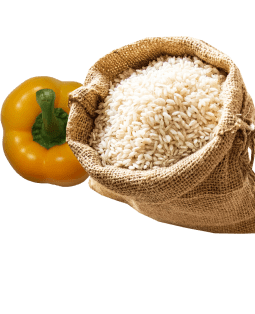September 14, 2022 (Nigeria) —Today, the Harvard Law School Food Law and Policy Clinic (FLPC) and The Global FoodBanking Network (GFN) released a new analysis on food donation laws and policies in Nigeria and recommendations designed to help reduce food waste, feed Nigerians facing food insecurity, and combat climate change. The research and recommendations are part of The Global Food Donation Policy Atlas, which maps laws and policies affecting food donation around the world.
Nigeria is Africa’s largest economy with a GDP of US$440 billion, yet about 116 million people–or 44% of the total population–are moderately or severely food insecure while about 40% of food produced is lost after harvest. Not only would redirecting edible food to food banks support Nigerians experiencing hunger, but it would also help reduce greenhouse gas emissions produced by food in landfills.The new resources from FLPC and GFN, released shortly before the International Day of Awareness on Food Loss and Waste, identify five key policy opportunities for Nigeria to reduce its food loss and waste, including:
“Nigerian leaders can help feed people experiencing hunger, reduce food waste and loss and help mitigate climate change,” said Emily Broad Leib, clinical professor of law at Harvard Law School and faculty director of the FLPC. “Our research and recommendations – developed in collaboration with Nigerian partners and stakeholders – provide practical, actionable guidance that builds on previous work for an even stronger response to challenging issues. Our research highlights tremendous opportunities for Nigerian leaders to take further action.”
“In view of the spate of hunger and rising food cost, there is an urgent need for more commitment from all stakeholders, government, and the civil society to end global hunger and malnutrition,” said Michael Sunbola, President of Lagos Food Bank Initiative. “Food Banks play an important role in addressing this menace in their local communities. This is why having a strong food donation and waste policy is crucial to making sure food loss and wastage is efficiently reduced. This step will create an enabling environment for food banks to continue their interventions and initiatives that will nourish and empower vulnerable families.”
“An estimated 702-828 million people are facing hunger globally, and that number is likely to rise as food price spikes, supply chain issues, and climate change continue to strain our food systems,” said Lisa Moon, president and CEO of The Global FoodBanking Network. “Food banks help ensure more people have access to food while also reducing food loss and waste. Strong food donation policies are absolutely critical to this work—they help food banks serve their communities in the most effective and efficient way.”
The Global Food Donation Policy Atlas, supported by Walmart Foundation, identifies existing laws and policies that support or hinder food recovery and donation in a comprehensive Legal Guide and offers Policy Recommendations for strengthening frameworks and adopting new measures to fill existing gaps. The analysis featured in these country-specific reports are also encapsulated in an interactive atlas tool that allows users to compare policies between countries participating in the project.Atlas project research is available for 18 countries: Argentina, Australia, Canada, Chile, Colombia, Costa Rica, the Dominican Republic, Guatemala, India, Indonesia, Kenya, Mexico, Nigeria, Peru, Singapore, South Africa, the United Kingdom, and the United States. An interactive map, Legal Guides, Policy Recommendations, and Executive Summaries for each country are available at atlas.foodbanking.org.
###
About The Harvard Law School Food Law and Policy Clinic
The Harvard Law School Food Law and Policy Clinic (FLPC) serves partner organizations and communities by providing guidance on cutting-edge food system issues, while engaging law students in the practice of food law and policy. FLPC’s work focuses on increasing access to healthy foods, supporting sustainable and equitable food production, promoting community-led food system change, and reducing waste of healthy, wholesome food. FLPC is committed to advancing a cross-sector, multi-disciplinary and inclusive approach to its work, building partnerships with academic institutions, government agencies, private sector actors, and civil society with expertise in public health, the environment, and the economy. For more information, visit chlpi.org/food-law-and-policy.
About Lagos Food Bank InitiativeLagos Foodbank Initiative is a non-profit nutrition-focused initiative with the goal of solving the menace of hunger, malnutrition and reducing food wastage through our programs that are targeted to the needs of the underserved. The Lagos foodbank is the first foodbank in Nigeria and was founded in 2016. Within its 6 years of operation, the Lagos foodbank has reached 2,000,000 beneficiaries across 160 communities, with a team of over 14,000 volunteers, and 7 active programs that are targeted at children, pregnant women, nursing mothers, the elderly and the unemployed/underemployed people. Currently, the foodbank has partnered with 100 nutrition-focused NGOs which has increased our reach, and the efficiency of our programs, and also reduced food wastage. Lagos foodbank also has resilient programs which provide employment opportunities through our job placement program which has catered to about 195 beneficiaries, and family farming program which trains and equips women in urban agriculture. For more information, visit lagosfoodbank.org.
About The Global FoodBanking NetworkThe Global FoodBanking Network supports community-driven solutions to alleviate hunger in nearly 50 countries. While millions struggle to access enough safe and nutritious food, nearly a third of all food produced is lost or wasted. We’re changing that. We believe food banks directed by local leaders are key to achieving Zero Hunger and building resilient food systems. For more information, visit foodbanking.org.
